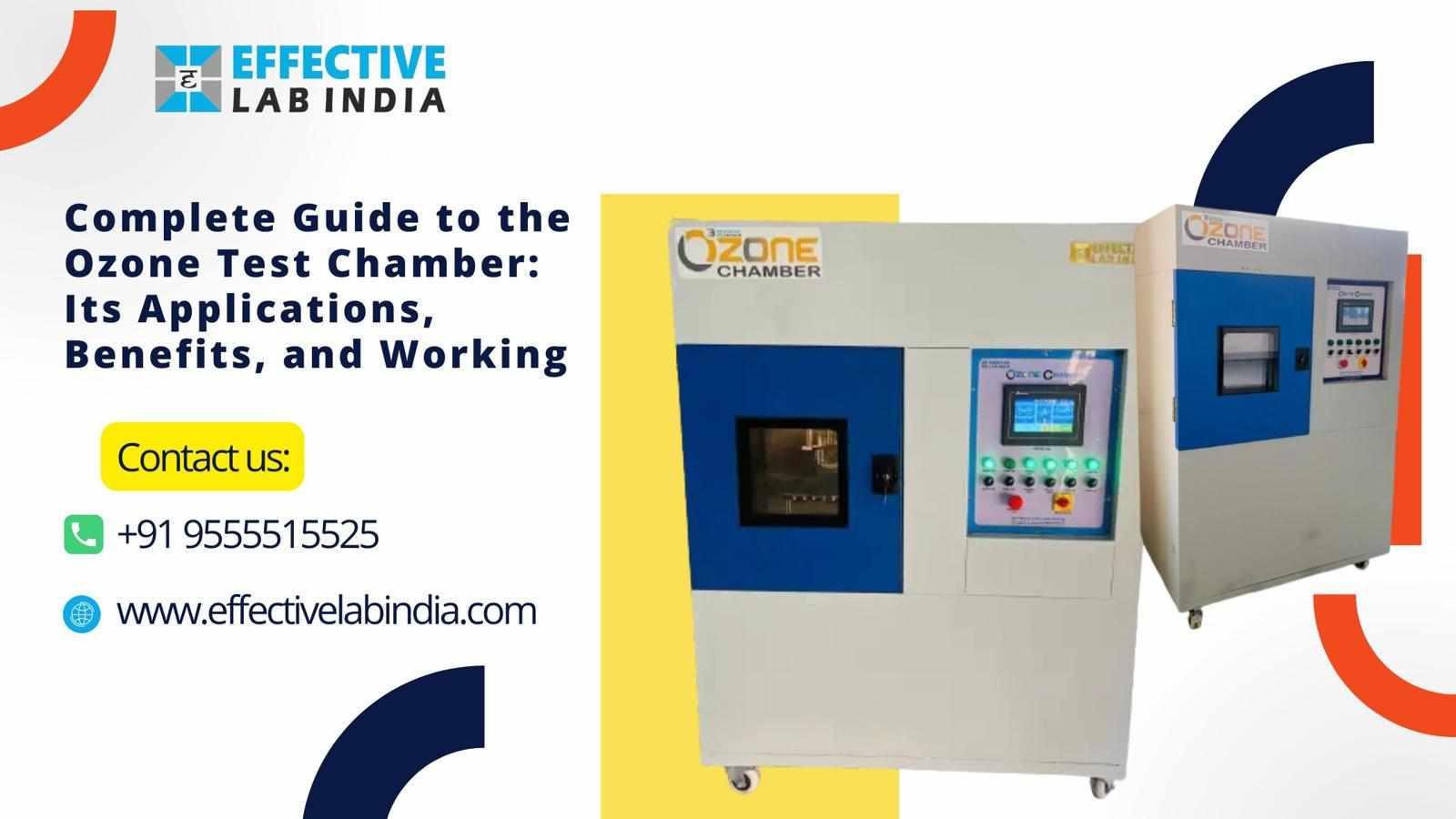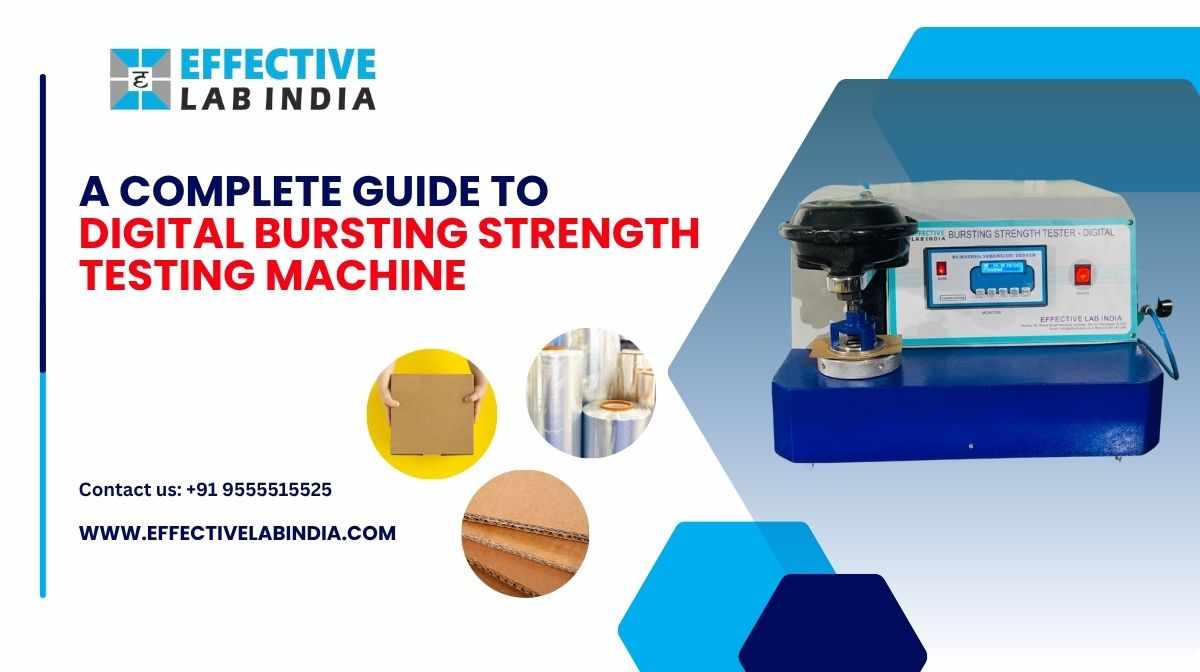
If you are involved in material testing, production or quality control, you can probably hear both conditions both tensile and tension tests. But are they the same? Or is there any difference between tensile and tension tests? In Effective Lab India, we are in the process of understanding these basic properties, and two words often come up that can be a little confusing: "tensile testing" and "tension testing." Are they the same? Is there a subtle difference? Let's break it down in an easy-to-understand way!
The Core Concept: Pulling Things Apart
Both tensile and tensile testing are about the same original idea: pulling a material to see how it behaves under stretching force. Trying to pull a rubber band until it takes a snap. This is really to simulate these tests, but in an accurate and controlled way.
What is Tensile Testing?
When we talk about tensile testing, we refer to a very specific and comprehensive mechanical test. This is like providing a material that undergoes a complete performance under tension. During a tensile test, a standardised sample of the material is gripped at both ends and pulled separately at a constant speed until cracks appear.
The tensile strength testing machine is a mechanical test where a sample is extended until it breaks to measure its strength and stretching. This helps determine the properties:
Yield Strength: The point that which the material begins to distort permanently (it will not go back to its original form).
Ultimate Tensile Strength (UTS): This is the maximum stress that the material can easily withstand before it begins to bend and eventually break.
Elongation: How much the material extension or deformation occurs before fractures are expressed as a percentage of the original length. This indicates the flexibility.
Young's Modulus (Modulus of Elasticity): A measure of resistance to the hardness of the material or resistance to elastic deformation.
In essence, tensile testing is a method to determine a material's complete tensile properties.
What is Tension Testing?
Tension testing is virtually another name for tensile testing. Both refer to the same test method, where tension (pulling) forces are used on a sample to understand its behaviour under the load.
However, in the broader structural or civil engineering line, tension testing can also refer to testing large components or mounting during stretch load, not just for small laboratory samples.
For example:
A simple pull test to check the bond strength of an adhesive.
A proof load test on a rope to ensure it can withstand a specific weight without breaking.
Checking the tension in a bolt to ensure it's tightened correctly.
All of these are forms of tension testing, but they cannot include detailed measurements and standardised processes for a complete tensile sample test. You can only be interested in whether something holds a certain weight or if it breaks at all, instead of its full stress-strain curve.
So, while all tensile tests are tension tests, not all tension tests are tensile tests.
Key Difference Between Tensile and Tension Testing
Significant Difference Between Tensile and Tension Testing
Tensile testing is a standard test performed on specimens, mainly test samples, to determine and examine the characteristics of a material.
Tension testing is a common term for applying stretching forces to any object or structure to inspect performance under the load.
In most laboratory contexts, they are used mutually.
“Effective Lab India: You have your permanent partner in material testing”
At Effective Lab India, we specialise in offering high-quality tensile testing machines and test solutions. Our equipment is designed to meet the strict requirements of different industries, which ensures accurate and reliable results each time.
Why is Tensile Testing Important?
It determines the quality of the material before it is used in machine production.
Contributes to ensuring load capacity and design safety
Helps in comparing materials to choose the best option
Ensures compliance with ASTM, ISO and BIS test standards
Applications of Tensile/Tension Testing
Metals industry – rods, sheets, wires
Plastics and polymer testing
Rubber testing for tensile strength and elongation
Textile industry – used in checking yarns, fabrics
Composites and adhesives
Construction materials like rebar and structural steel
How Does a Tensile Test Work?
Sample Preparation - Cut according to standard dimensions
Keep the sample in jaws or fixtures
Apply the force slowly until it breaks
Record data load, extension, stress-load graph
Calculate properties such as UTS, Yield, stretching and Modulus
Standards for Tensile Testing
ASTM D638 – Plastics
ASTM D412 – Rubber
ASTM A370 – Metals
ISO 527 – Plastics tensile
ISO 37 – Rubber and elastomers
Effective Lab India – Leading Manufacturer of Tensile Testing Machines
If you are looking for a reliable manufacturer of tensile strength testers, Effective Lab India lives up to your expectations:
Choice of digital and computerised tensile tester models
Capacity range from 50 Kgf/ to 5000 Kgf/
Advanced cells for accurate measurement
Custom grip and fixtures for rubber, plastic, metal, textiles, cable and composite items
User-optimise software with automatic calculations
Least count for material elongation: 0.1 mm
Testing speed range: 40mm/min to 400 mm/min
Load units used: Kgf
Speed control: Dedicated AC Drive
Power Supply: 230 Volt AC, 50 Hz, Single-Phase
Boy/Paint: Powder Coating/Mild Steel(S.S.)
Tensile strength tester price in the Indian market
Depending upon the increasing market size and demand, the price of a Digital Tensile Strength Tester may vary considerably depending upon its capacity, features (e.g., computer controlled, specific grip, motor, body size) and manufacturer. The price of this machine by Effective Lab India is much lower than other companies, with a starting price range of Rs. 84500 to Rs. 249000.
FAQs on Tensile and Tension Strength
Q: Are "tensile strength" and "tension" the same?
No. Tensile strength is a specific mechanical property (maximum load before breaking) measured during a tensile test. While tension is a common stretching force.
Q: Why is tensile testing important?
It is important for material choices, quality control, product design, and to ensure the safety and reliability of components in different applications.
Q: What kind of materials can be tensile tested?
Almost any material: metal, plastic, composite, textiles, wires, plastic films, rubber and more.
Q: Is there an international standard for tensile testing?
Yes, general standards include ASTM E8 (for metals), ASTM D638 (for plastic) and ISO 6892 (for metals).
Q: Does Effective Lab India provide after-sales support for tensile testing machines?
Absolutely! We offer extensive installation, training, calibration and maintenance services to perform your equipment better.




















Write a comment ...